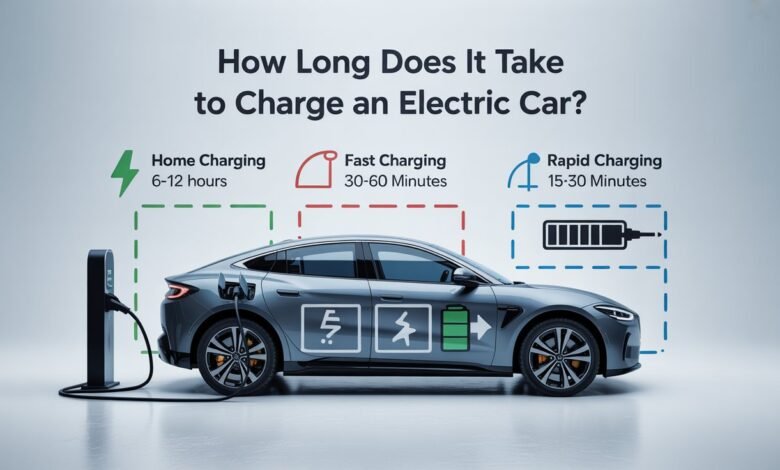
How Long Does It Take to Charge an Electric Car? Real-Life Takeaway
So here’s the thing — I bought my first electric car last spring, kind of on impulse. It looked sleek, had that quiet “sci-fi movie” vibe, and everyone kept talking about saving on gas. I figured, why not? But about two days in, I found myself standing in the garage at midnight, staring at the little green light on the charger and thinking, how long does it actually take to charge this thing?
I’m writing this like I’m sitting on my front porch with a cup of coffee, thinking back over the last six months of plugging in, planning errands around charger stops, late-night “just‐in‐case” top-ups, and the occasional panic when I realize I forgot to plug in. So you’ll get the casual version — mistakes, surprise discoveries, short and long sentences, yes — and I’ll try to weave in some useful info for you too.
My Journey to the “Plug-In Life”
Let me start at the beginning. I moved to the suburbs of Ohio from a rental apartment in the city, got my charger installed in the garage (more on that later), and decided to go full-electric. I had the biggest question in my head: how long does it take to charge an electric car compared to filling up at a gas station? Because in my old gas car life, I’d pull into a station, five minutes later boom, off I go. Could electric be that simple?
Turns out: yes and no.
First Impressions
When the dealership handed me the key (or rather, the fob), I remember asking: “So… how long does it take to charge it?” The sales guy gave that non-committal smile, “It depends on the charger, the battery, where you are…” And I thought, great, “depends” isn’t super helpful.
But as soon as I drove home, I kept an eye on things: The car arrived with about 80% battery, I left it plugged in at home overnight, and by the morning it was back to 100% Easy. But that was the simplest case.
The Big Variables—What Really Affects Charging Time
Here’s where things get real. Because “how long does it take to charge an electric car” isn’t a single number. It depends on several factors:
Charger Type (Level 1, Level 2, DC Fast)
-
Level 1 (Standard household outlet): I tried this for a week when my wall charger wasn’t installed yet. Plugged into the 120 V outlet in the garage, I got maybe 3–5 miles of range per hour. So if I needed 200 miles, this would take… math… 40 hours? Yeah, not fun.
-
Level 2 (Home wall-unit, ~240 V): This is what I settled on. My charger gives roughly 25–30 miles of range per hour of charging. Overnight (8–10 hours) fills me up when I start with maybe 15–20% left.
-
DC Fast Charging (Public stations, ~400 V+): This one is the “gas station” equivalent. I used it on a road trip: in about 20–30 minutes I got from 10% to ~70%. But full 100%? Takes longer and is less efficient.
Battery Size and Current Charge Level
If your car has a large battery, say 60–100 kWh, charging from 10% to 100% takes longer than a smaller one. Also, if you’re going from 80% to 100%, it slows down dramatically (battery chemistry thing). So going from 0% to 80% might be much quicker per unit of range than from 80% to 100%.
Vehicle’s Onboard Charger & Rate Limits
Your car itself limits how fast it will accept power. For example, my car’s maximum home charging rate is 7.2 kW, so even if the wall unit could push 11 kW, I’m capped. On a DC fast charger the car might accept 50 kW or more, but only for a while.
Temperature, Battery Health & Location
Cold or hot weather slows things down. If it’s freezing in Ohio and I plug in, the car will do “pre-conditioning” first, so charging is slower. Also, younger batteries accept power faster; older ones slower. And if the charger is far from ideal (its own issues) it can add time.
My Real-World Timelines (Because Anecdotes Help)
I promised real stories. So here are some scenarios I lived through — you’ll see how “how long does it take to charge an electric car” unfolds.
Overnight at Home
One typical weekday evening, I end my drive at 6:00 PM with ~20% battery left. I plug into the Level 2 charger in the garage. By the time I wake up at 7:00 AM, it reports ~100%. That’s about 13 hours, but a lot of that is idle time (car already full, just holding). The actual “charging” time might be 7–8 hours until it reaches 100%. So for me, home charging overnight is basically no big deal. I wake up with full battery, coffee in hand, ready to go.
Weekend Errand Top-Up
Saturday morning I remembered I planned a drive, and I was at ~40%. I plug in for 2 hours while I grab groceries and longer coffee. After 2 hours, I’m at ~85%. Great. So here the “how long does it take to charge an electric car for a partial charge” answer is: a couple hours gets you a bunch of range.
Road Trip & DC Fast Charging
Last month I took a trip of about 250 miles. I started at home with 100%. After 150 miles I’m at ~20%. I pull into a highway rest-stop with a DC fast charger (free for 30 minutes). I plug in and watch the percentage climb. In 20 minutes I’m up to ~60%. After another 10 minutes I’m at ~75%. I decide “good enough” because stopping any longer will cost me more time. So I drive on.
This shows: at public fast chargers, you can get major range in 20-30 minutes. But going to 100% might add another 15-20 minutes and the cost is higher. So for road trips, most drivers aim ~80-90% then roll.
Practical Tips I Learned — For You
Since I’ve been doing this for half a year, I’ve collected some lessons.
Try Always to Charge Overnight at Home
If you can, install a Level 2 charger at home. I did, and now I mostly plug in nightly. It means I rarely worry about charge times before driving. Also, charging when electricity rates are lower overnight is a bonus.
Don’t Always Charge to 100% Unless You Need To
My car suggests charging to ~90% for daily use; 100% is for long trips. Why? Because staying at 100% for long can slightly wear the battery faster (and also more idle “full battery” time). So unless I’m heading on a long drive, I aim for 80–90% in the morning.
Road Trip Strategy = Top Up Smartly
On the highway, I make a plan: drive until maybe 15–20% left, then find a fast charger, plug in for 20-30 minutes, then go. That works better than trying to “fill up to 100% and go for hours.” It saves time, reduces stress. So the big question “how long does it take to charge an electric car on route?” is answered: maybe ~20-30 minutes to get to 60-70% at a fast charger — enough to keep rolling.
Manage Expectations
When I told friends “I got an EV,” folks asked me “So how long does it take to recharge? Is it slower than petrol?” My answer: yes, slower in some cases, faster in others. If I had to wait four hours at a gas pump every time I needed fuel, I’d be annoyed. But since I plug at home while sleeping, it’s mostly invisible. The occasional 20-minute stop on a trip is no big deal.
Rough Charging Time Chart
Here’s a rough rule-of-thumb timeline from my experience (your numbers may vary):
| Situation | Approx Time | Range Added (Miles) |
|---|---|---|
| Level 1, home (~120 V outlet) | 20–40 hrs | ~40–80 miles |
| Level 2, home (~240 V) | 6–10 hrs | ~200–300 miles |
| Level 2, partial top-up (home) | 1–4 hrs | ~50–120 miles |
| DC Fast Charger (public, highway) | 20–40 mins | ~150–250 miles |
So when someone asks “how long does it take to charge an electric car?” you can say, “It depends on the type of charger and what you’re trying to do,” but these numbers give you a ballpark.
Addressing Some Common Misconceptions
“It takes HOURS every time”
Actually no — if you plug in overnight at home, it’s mostly invisible. You wake up with a full battery. The “hours” are while you sleep or while you grab lunch — you’re not stuck by the charger unless you’re on the road.
“You must go to a special station all the time”
Not true. Most everyday charging happens at home or maybe at work. Public fast stations are for when you’re traveling or need a quick top-up.
“Filling a dead battery to 100% is always the goal”
In my experience, only for long trips. Daily driving? Aim for 80-90% and you’ll be fine, your battery will thank you, and your car will be ready.
FAQ Section — Frequently Asked Questions
Q1: How long does it take to charge an electric car at home?
A: If you have a Level 2 home charger (≈240 V), expect about 6–10 hours for a near-empty battery to full. If you’re topping up overnight from, say, 20% to 90%, it may only be 4–6 hours. If you plug into a standard 120 V outlet (Level 1), it could take a day or more.
Q2: How long does it take to charge an electric car using a public fast charger?
A: With a DC fast charger, you might get from 10% to ~60–70% in about 20–30 minutes, depending on the vehicle and charger speed. Going to 100% may take longer and is less efficient.
Q3: Does charging slow down when the battery is nearly full?
A: Yes. Many EVs slow the charging rate as the battery nears full to protect battery health and due to the chemistry. So the last 10–20% may take as long as the earlier part.
Q4: Does weather affect how long it takes to charge an electric car?
A: Absolutely. Cold or extremely hot weather can lengthen charging time because the battery needs to warm up or cool down first. Battery health, charger condition, even the charger’s power supply can shift things.
Final Thoughts / Conclusion
So here’s the “diary entry” wrap-up: when I first asked how long does it take to charge an electric car, I imagined sitting at a plug for hours every day and being annoyed. But in truth? It’s mostly invisible, if you have a good home charger and you’re charging overnight like I am now with a (half-drained) cup of coffee beside me.
Sure, if you’re on a long road trip you’ll spend 20-30 minutes at a fast charger (or maybe longer if it’s busy or slow). But you’ll also get to stretch your legs, grab a snack, check your phone, plan your next stop. That little pause is a minor inconvenience compared to the old “sit at a gas station and wait” scenario.
So the next time someone asks you, “So, how long does it take to charge an electric car?” you can say something like: “It depends — but for me at home, overnight is plenty, and on the highway a quick 20-minute stop usually does the trick.” Not bad, right?
And if you’re considering going electric yourself — or just curious — let this be your realistic baseline. Install a good charger at home, get comfortable with nightly plug-in, plan your road trips with confidence, know that charging is manageable. Your life probably won’t revolve around plug-ins; your car will simply plug in while you unwind, sleep, or run errands.
Thanks for sticking with me through this ramble. If you have more questions — “What about cost?” “What about charging etiquette?” “What about batteries years down the road?” — just holler. I’ll share more real-life… er, diary-style experiences.
Catch you again when I’m plugging in for my next road trip!




